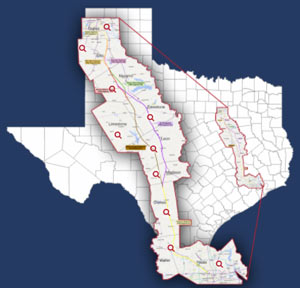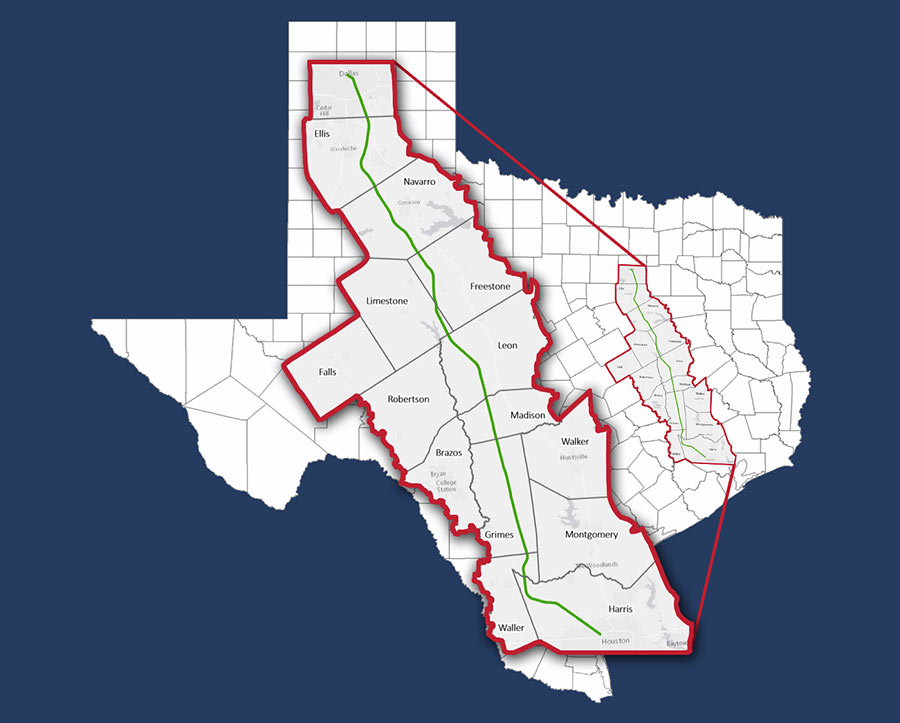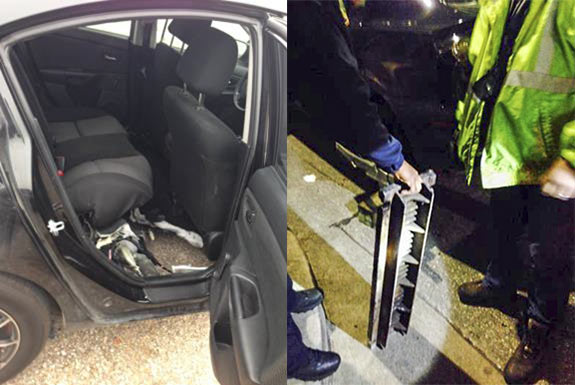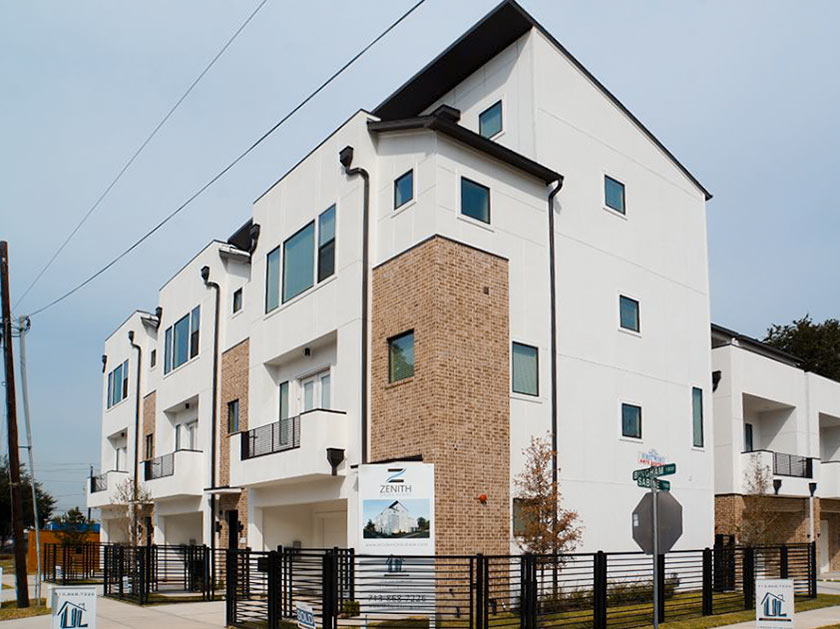HIGH SPEED RAIL CASE HEADS TO TRIAL  A trial has been set for July 3rd for the case over the would-be bullet train between Houston and Dallas, Kyle Hagerty reports today. Judge Halbach denied bullet train developer Texas Central a preliminary injunction it had requested, which would have forced some unenthused landowners along the proposed rail route to allow the company surveying access to their properties. The surveying is only one of the hangups currently facing the project; in addition to delays on the project’s environmental impact studies, Hagerty writes that the rail company “admitted to having less than 1 percent of funding needed for the project,” and notes that the estimated completion date has been scooted back from 2021 to 2022. [Houston BisNow; previously on Swamplot] Map of proposed high speed rail routes: Texas Central
A trial has been set for July 3rd for the case over the would-be bullet train between Houston and Dallas, Kyle Hagerty reports today. Judge Halbach denied bullet train developer Texas Central a preliminary injunction it had requested, which would have forced some unenthused landowners along the proposed rail route to allow the company surveying access to their properties. The surveying is only one of the hangups currently facing the project; in addition to delays on the project’s environmental impact studies, Hagerty writes that the rail company “admitted to having less than 1 percent of funding needed for the project,” and notes that the estimated completion date has been scooted back from 2021 to 2022. [Houston BisNow; previously on Swamplot] Map of proposed high speed rail routes: Texas Central





This is ridiculous. We need to have a rail connecting two of our biggest cities. All the people travelling between Dallas and Houston over the holidays will be stuck in up to 7 hours of traffic. I have seen the presentations and this train will quietly pass through land and be a good neighbor. People in rural areas do not get to veto transportation and utilities needed to go through the state for the rest of the population.
–
As to the one percent funding. That’s not really a good argument against. They will raise the funds as preliminary barriers are overcome. Also, they are obviously a train company. Do they need to buy out some really small train company for bona fidesign? That cant be an efficient use of funds.
–
The state population is rapidly expanding. Transportation is needed.
*Bona fides
We don’t “need” this train, try again.
“this train will quietly pass through land and be a good neighbor.”
Bwwaaahahahahahahahaha
The rail folks have been lying to land owners. The suit proves that. Well to most people. I guess the ones that think 100 tonnes of steel moving at 100 mph, is “quiet”, well they wont let facts sway their opinions. No matter what.
It is ridiculous. But if this past election has proven anything, it’s that rural residents aren’t putting up with urban residents telling them what’s good for them anymore. Especially when the city folk are completely right.
.
It’s the age of the tantrum, everyone – buckle up.
They are using high speed technology. There are examples in Japan of exactly what they will be using so feel free to back up you assertions with evidence. This isn’t a coal fed train. The opponents just don’t want to look at a train, any train, no matter how beneficial it will be to others.
Just a lane or two to I-45 and be done with it. Self driving cars are right around the corner. This choo choo train is 40 year old technology. Southwest has a flight leaving every 30 minutes from HOU if you don’t want to drive.
Where did the “quiet” myth come from? Watching a high speed train moving down the tracks in excess of 100 mph may appear quiet from a mile away, as one rides down a highway at 75 miles an hour in a relatively noisy auto with the windows up, but standing in a truly quiet field 200 feet away, the experience would more closely resemble being buzzed by a Boeing 777 airliner flying at 100 feet.
Perhaps Commernter7 would like a comfortable home in a rural setting 100 feet from the main line? No? Hmmm.
Just spent 2 weeks traveling across Japan via shinkansen (bullet train). I can attest that they are shockingly quiet – no louder than a single average automobile. The new high-speed trains are built not just for speed, but also for minimal sound nuisance.
Travel by high-speed train is not just faster than driving, it’s also an improvement to quality of life – rather than sitting in bumper-to-bumper traffic and keeping your eyes on the road, you can work, study, read, listen to music, or even sleep. It’s also much easier to board and exit a train than it is to drive to an airport, park, take an airport shuttle to a terminal, wait in line for security, waste time waiting for your flight, fly, taxi, then wait for your luggage. Train stations also are usually located centrally in a city, rather than 20-30 minutes outside a city, providing much more convenience for travelers.
I’m not involved with this rail project at all, just a convert to travel by high-speed rail after having great experiences in Japan and all over Europe.
This is probably the most ridiculous example of NIMBY in Texas state history. Why should the complaints of the maybe what, a couple thousand people that are actually affected by the route going through their property, outweigh the need of the approximately 20 million people of the Houston and DFW regions? High speed rail is obviously a very good thing for our state. Go to Europe and ride one, see how easy, comfortable, affordable, and efficient of a way it is to travel.
Hopefully, this is just a money grab by the Texans Against High Speed Rail group. I do think that if the rail goes through your property, you should be entitled to some generous royalties, similar to what oil exploration companies offer to land owners. I think a lot of the resistance to this comes from the recently emblazoned Trump voters who hear things like Property Rights, big government, and State’s Rights thrown around and get all fired up about it. Meanwhile, they probably don’t live anywhere near a proposed route, and probably don’t even own land.
So just go to court, settle your case for some royalties, take your free money, and shut up. I doubt your cows will mind the occasional train whirring by.
Prior to opening a HSR line in 2007, the Madrid-Barcelona corridor had some of the highest passenger counts of any air route in the world, with multiple flights per hour. Within 2 years of the high speed rail line opening, the air traffic plummeted to a quarter of what it had been previously. A Houston to Dallas rail line would most likely have similar results. But the rural voting block in this state continues to exert an outsized influence on state politics and development.
Freight trains blaring their horns through tiny towns aren’t a nuisance but suddenly a high speed passenger train is (that doesn’t need to blow a horn since the crossing will rarely be at-grade)? And Al, come on, a high speed train is not comparable to “being buzzed by a Boeing 777 airliner flying at 100 feet.” That’s not even in the same ballpark.
This isn’t an occasional train. This every 30 minutes, a train buzzing your property at 100 mph. And getting royalties isn’t enough. This takes a chunk of your property completely out of use FOREVER (lost income), diverting the natural flow of water (which is illegal to do if you cut off someone else’s flow) and channeling it through pass-ways under the train berm (swamp city). Unless they actually BUY the property, the land owners still have to pay taxes on it, even though they cannot use it and the remainder of the property is devalued.
As far as the stations, they will not be in downtown Houston. The Houston one is planned for around Northwest Mall area. Other than Dallas, the only station is in Grimes County, 30 miles from College Station. Not exactly what I would call convenient. If you rode in one of these, you wouldn’t hear what the rest of us would hear. You are in the insulated cabin.
The HSR people brought this on themselves. People objecting to this are not objecting to the idea of HSR per se. It is to the route chosen. Texas Central could have avoided much grief by:
Using the BNSF Route, which actually parallels a real “utility” (freight train) and which would have far fewer objections by land owners. It is also much more direct and shorter than the so called “utility corridor” which does not feature a utility for almost the entire part of its Houston area length. Texas Central did not want to pay the so called “indemnity” fee to BNSF. That was a huge mistake on their part.
Second, using the “Utility” Corridor, they were supposed to follow the high voltage transmitter lines east of Hockley. This would have eliminated most issues with landowners except for a mainly white, members only country club and some others big wigs. They switched the route to move it West of Hockley, an area with NO UTILITIES, and into a majority MINORITY area in violation of federal statutes. If the project fails it will be because of this switch West of Hockley.
They chose to pick a fight with scores of well heeled, sophisticated Houston area landowners who understand that this is a Dallas and Japanese effort to screw Houston by selling a dated system, and containing the City’s growth with a ring on its West side to stop westward growth. The “ring” makes properties on the “right” side of the tracks more valuable and harms properties on the other side. Guess who owns the properties on the right side? Japanese firms and their banks! Check out Sumitomo and Towne Lake.
Why do you think there is an African American political coalition called “Across the Tracks?” Guess what, the City of Praire View will be on the wrong side of the tracks thanks to Texas Central….and letting some Prairie View A & M architecture students work for TCR for free by drawing a TOD does not make up for it. Where is Jesse Jackson? Al Sharpton?
Texas Central parades a multitude of milquetoast middle aged white men as their public face, trying to be nice and sensitive, but behind the scenes sues, harasses, and intimidates Houstonians and others.
Again, issue is not with the rail, it is with the route chosen. It is wrong………there is a way for everyone to win, move the route!
Imagine living in houston and commuting on the bullet train to DFW to work. Hahaha
Towne Lake owned by the Japanese and Dallas trying to stick it to Houston with an inferior rail line they will share with us… Alex Jones, when did you start reading Swamplot?
–
In actuality, I heard the rail is to generate speeds high enough that it will tow along a DeLorean equipped with a time travel machine. Then they will get rich by buying a sports almanac and marrying Michael J Fox’s mom.
Commenter7: I agree we should have rail connecting Houston and Dallas. That’s why I won’t be particularly sad if this project fails—it doesn’t attempt to do that. Rail that actually ran all the way into town, and ideally to the airports too, would be worth defending against the NIMBYs. Such a thing is perfectly possible—we just have to decide to do it. But I wouldn’t strain myself defending this current proposal.
One shouldn’t let the perfect be the enemy of the good. But rail that just connects two suburbs isn’t even good.
I lived in Japan for 2 years and lived in Europe for several months and have visited both on multiple occasions. I absolutely love the Shinkansen and its European counterpart. It wasn’t terribly loud from the outside and the noise lasted a matter of 2 seconds because they were so fast. As for the argument that there should be more stops…the point of Shinkansens are to go extremely fast with minimal stops. If there isn’t a significant population, there’s no point to put a Shinkansen station there; rather, you should have an express train station or local station there. Just another NIMBY complaint, imo.
To add to what @tejas said about cutting off access to water, this is also going to cut off grazing land for cattle, which appears to be the purpose of most of what exists in the vast rural space between Houston and Dallas. There’s a rule of thumb that says you need around 2 acres of land per head, plus or minus depending on the soil quality, etc. If you run a ground-level rail line through the middle of someone’s grazing land, guess what, they can no longer support as many cattle on their land, so you’ve just killed their livelihood.
Maybe it is just me, but I feel like the folks that are for the HSR are the same people that are against the Dakota pipeline. The HSR will undoubtedly have large environmental concerns for the state.
Love the idea of HSR to Dallas, but they have gone about this is the wrong way. The way they have used their extortion techniques to bully landowners in to signing unfavorable agreements was shameful.
I just simply don’t believe in “privatized” infrastructure or american voters not continuing to elect self serving idiots into office that can’t even balance their own personal check book.
.
In america there is no such thing as a private/public partnership that does not involve telling taxpayers to bend over. If we’re too dumb to build it ourselves then we’re obviously too dumb to manage it appropriately from the start.
WOW ShadyHeightster, that is the most ridiculously deceptive use of a statistic i have seen in a looong time!
Considering Spain’s economy crashed dramatically in 2008 (much worse than ours) OF COURSE air travel between Madrid and Barcelona dropped by 75%!! How about you use ridership numbers for the train route! Shocking.
Folks here throwing around “statistics” like they actually knew what they were talking about.
Money to the rural landowners? If the railroad is offering competitive prices for the property, why do they need imminent domain privileges?
Needs of the people? There are nowhere near “20 million people” that would benefit from this train. More people will hear it, wait at crossings for it, and lose property over it than actually ride it. Their web site claims they can have 5 million passengers within 5 years of startup. But the State’s study from 2011 says: “Approximately 3.3 million airline passengers and 4.0 million passenger automobiles travel between Dallas-Fort Worth and Houston each year. Based on an assumption of diversion rates to high speed rail of 70 percent from airline and 20 percent automobile travel, a potential ridership for the Dallas-Fort Worth to Houston core express high speed rail service may be approximately 3.1 million riders.” By the way, the State’s study was for a rail heavily supported with tax money (i.e. cheap fares). Do you believe those percentages, especially “full-fare?”
Travelers save money? If you actually had attended one of the town hall meetings, you would know that they admit that if they charge the same average fare as a Dallas-Houston airfare, they won’t cover operating costs unless they average more passengers daily than ALL airline flights on the same route. And they also claim that they only have to cover operating costs, because the capital costs will be paid for by giving investors the opportunity to invest in real estate and new businesses close to the train stations. They really did say that! Is it any coincidence that the President of Texas Central Partners is from the company with one of the largest real estate holdings in downtown Dallas?
Expertise? The upper management of Texas Central Partners are investor/asset management types. They have removed it from their web site, but they used to admit they would hire another company(s) to build and to operate this railroad. In fact, the earliest version of their web site admitted they wouldn’t build the rail, they were formed just to handle fund-raising and D.C. lobbying. The main office was in D.C.
Re: Environmental Impacts. The HSR would obviously not be without adverse social or environmental impacts. Nor are jet aircraft or passenger vehicles or the infrastructure, manufacturing, and support services that are required to continuously and reliably field those fleets. The only way to wholly avoid environmental impacts is to forego consumption, but we aren’t having that conversation. If there’s going to be any travel at all between the two cities, as I think we all can agree is perfectly reasonable, then this is an optimization problem and HSR has to be considered for its potential as one part of an optimal solution.
.
But as it stands, we aren’t having *that* conversation either. By and large, we didn’t have that conversation (publicly) about billions upon billions of dollars spent on electric transmission lines from west Texas to carry wind-generated electricity, we didn’t have that conversation (publicly) about a vast entanglement of supply pipelines through south Texas to feed Gulf Coast refineries, we haven’t had that conversation (publicly) about freight rail congestion, noise, or hazardous cargo, we haven’t had that conversation (publicly) about how we allocate surface water resources between urban and agricultural users, and we haven’t had that conversation (publicly) about how utility districts are financed. All of these issues have been addressed and hashed out in the obscurer quarters of government, but none have been opened up to the same degree of populist outrage as seems to be the case with this HSR project — even though it is of far less consequence.
.
Instead, the conversation that’s being had seems to pit urban and rural constituencies against one another, with vague and disingenuous arguments being concocted that they believe will appeal to the other side, such as that: 1) there’ll be a bankruptcy, inevitably resulting in some form of taxpayer bailout, 2) there’ll be vaguely-specified environmental degradation, 3) existing law is presumed to be cherished or immutable and would ostensibly be broken, 4) there exists a conspiracy against special populations, and my personal favorite 5) an evil cabal of wealthy people will benefit financially under one scenario, pretending that the persons behind that message aren’t an evil cabal of wealthy people who stand to benefit under the other scenario.
.
Yes, there are winners and losers with the HSR project. There are winners and losers if we do something else. There are winners and losers if we do nothing. The losers, if something they already have has been taken away, should be amply compensated; the system that we have for achieving that is not perfect, and we should talk about that and try to use the HSR controversy as a means to make it more perfect. However, let’s not pretend that a person’s claim to real property is eternal and immutable. Our system of property taxes amounts to a situation where we are all mere lessors from the state. We are perfectly okay with that, it seems, and we’ve been okay with railroads and pipelines and eminent domain for quite some time. If *this* is the thing that got people outraged then that outrage strikes me as grossly disingenuous.
Screw the rural land holders. The A-holes always try and ruin everything for the masses. Hopefully the company prevails in ALL of it’s legal battles. BTW, I own rural land and would welcome a train going by/through my property vs.another damn road/highway !!! Cars are so 19th century ..
I like how yall “city folk” are bashing the people against this in rural areas. Couple of thousand in the country Verses the millions in the cities. All I have to say is open your fng eyes! I’m from the city of houston born and raised. The texas high speed rail known as the texas bullet train now is lying to everyone. I have family that owns land on the proposed route. And guess what? It’s historical property and they want all 125 acres of it for this rail. Why would you need that big of a property when it’s all supposed to be in the air making little impact on the land and easy access for the land owner? Low balling land prices and not being fair ? And then telling them that , and there comeback we are going to sue you for eminent domain and you won’t get any money from us and we will just take your land which you have worked so hard for through life! So yea screw yall!